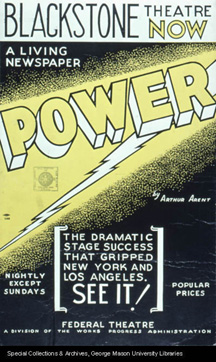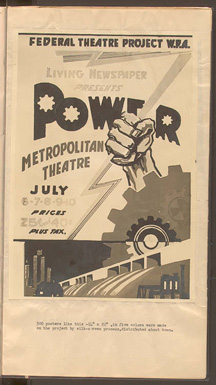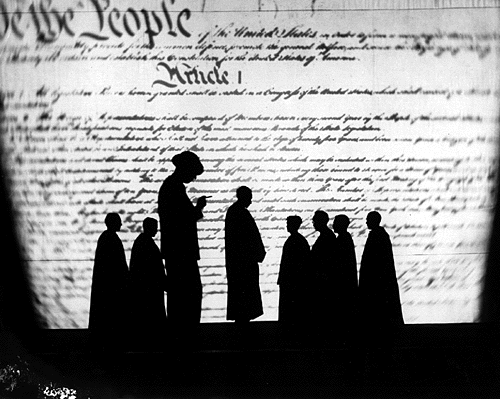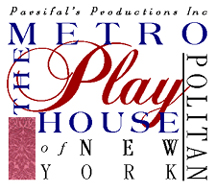Power
| Poster from the Blackstone Theatre;
Courtesy of
the Library of Congress, Music Division, Federal Theater Project
Collection |

Metropolitan turns on the first
revival of Arthur Arent’s Power, a
“Living Newspaper” created for the WPA’s Federal Theater Project in
1937. A mix of documentary and vaudeville, this fast-paced,
many-character play, hums out of the Great Depression with panache and
surprising resonance today.
Power’s subject is a power struggle: who controls the electricity
supply? In the early 30’s, about 90% of electrical generation and
distribution was concentrated in urban areas, and about 90% of that
industry was in the hands of private holding companies, whose complex
business structures made unfair market practices practically invisible.
However, a series of investigations into those practices and a
devastating power failure in Newark, NJ, paved the way for Franklin
Delano Roosevelt’s assertion of the federal government’s “sovereignty …
[and] control of its power resources.” As access to electric power
became more and more a necessity of modern life, so the private control
of that access was seen as increasingly abusive. The question of urgent
moment: Is power a private commodity or a public good?
Power strikes theatrical sparks with those issues, telling the story of
the Newark blackout and the creation of the Tennessee Valley Authority,
all while giving a dynamic crash course in economic and electrical
theory and a charged critique of the balance of power. The play races
across the country, from boiler room to boardroom, weaving together 21
practically vaudevillian vignettes with an affable narrator.
A topical work of art from a bygone era, the play is a fascinating
artifact of America’s theater history. But as we always find at
Metropolitan, this piece of the past has a great deal to tell us about
our present. The questions that provoked the Living Newspaper Unit seem
very current indeed. Spurred by manipulations of commerce and capital,
misuse of political clout and economic influence, and disparities in
the lives of thosewho have and those who need, the artists who created
Power crafted a savvy and pointed indictment of business as usual.
Today, we ask if credit markets are properly regulated, if water can be
available to all, if health care is a public right or a private
privilege, and, ironically, if our systems that supply electricity are
founded on technologies that do more harm to the world than the good
they provide.
There is no missing the political slant and the propagandistic tone of
Power (hint: it won’t play on Fox), but seen today, all the more
engaging are its cogent perceptions and its spirited style.
Metropolitan will bring them to life with 9 actors playing the 100+
roles under the direction of Mark Harborth, whose inspired vision of
Eugene O’Neill’s early plays was last season’s Pioneer.
As part of our Season of Work, we are proud to restage such inventive
and provocative theater, another gem in the treasure of American
experience
|
 The
Federal Theater Project and The Living Newspaper
Unit The
Federal Theater Project and The Living Newspaper
Unit
New Deal art may bring to mind Deco murals depicting urban
industry,
agricultural bounty, and union organizers. But nearly 13,000 artists,
technicians, researchers, and staff in at least 40 cities were employed
through the Federal Theater Project.
The FTP was established in 1935, and under playwright and producer
Hallie Flanagan, the project gave work to such luminaries as Susan
Glaspell, Elmer Rice, Orson Welles, John Houseman, Arthur Miller, and
Elia Kazan, staging traditional dramas, re-interpreting classics, and
creating myriad new works for the Depression Era stage. Most familiar
to theater aficionados are Welles’s Voodoo Macbeth, W.E.B. DuBois’s
Haiti, the Swing Mikado, and an adaptation of Sinclair Lewis’ It Can’t
Happen Here.
The fame of more topical productions has faded with the years, and
among them were the productions of The Living Newspaper Unit. The unit
created a new theater of current events, extensively researched (its
staff included unemployed members of the American Newspaper Guild) and
pointedly political. From the start, this work struck some too close to
the bone: its first creation, Ethiopia (1936), drew criticism from the
State Department for its portrayal of foreign leaders and was cancelled
by the WPA before it was staged.
Poster for the Seattle production
...at the
Metropolitan!
Courtesy of the
Library of Congress, Music Division, Federal Theater Project Collection
|
All of the plays produced set out to be at least as potentially
controversial. “A dramatization of a problem”, in Arent’s words, a
Living Newspapers’ techniques eschewed the devices of psychological
realism to embrace characters who embodied opposing social and cultural
forces. Living Newspaper Plays included Triple-A Plowed Under, an
i ndictment of the
Supreme Court’s striking down a farm bill, Injunction
Granted, skewering business leaders such as William Randolph Hearst and
H.J. Heinz, One Third of a Nation, exploring poverty in the US, and
Spirochete, about the spread of Syphilis. ndictment of the
Supreme Court’s striking down a farm bill, Injunction
Granted, skewering business leaders such as William Randolph Hearst and
H.J. Heinz, One Third of a Nation, exploring poverty in the US, and
Spirochete, about the spread of Syphilis.
Ultimately, the Federal Theater Project lost its Congressional funding.
It had always been opposed by New Deal foes who disapproved of any
state funding for the arts at all; but also by New Deal supporters who
were leery of the productions’ leaning too far left. In 1938, defending
the program to the Special Committee to Investigate Un-American
Activities in 1938, director Flanagan painted an idealistic portrait of
what she called “propaganda for democracy”. “Living Newspapers report
the struggle of the modern man to understand the forces all about him;
agriculture, power, law, housing, social diseases, medicine.” Even so,
in 1939, the Federal Theater Project was history.
-written by Alex Roe
|


 The
Federal Theater Project and The Living Newspaper
Unit
The
Federal Theater Project and The Living Newspaper
Unit ndictment of the
Supreme Court’s striking down a farm bill, Injunction
Granted, skewering business leaders such as William Randolph Hearst and
H.J. Heinz, One Third of a Nation, exploring poverty in the US, and
Spirochete, about the spread of Syphilis.
ndictment of the
Supreme Court’s striking down a farm bill, Injunction
Granted, skewering business leaders such as William Randolph Hearst and
H.J. Heinz, One Third of a Nation, exploring poverty in the US, and
Spirochete, about the spread of Syphilis.